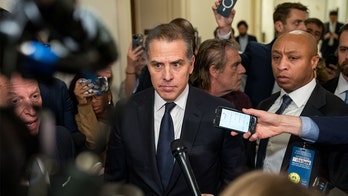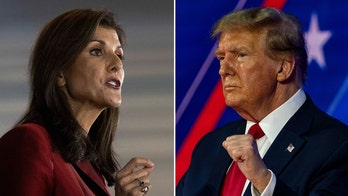JAMES ROSEN: Mr. Secretary, thank you for this honor. I’m told by my friend, Geoff Morrell, I only have seven to ten minutes for this.
ROBERT GATES: [Laughter]
ROSEN: I’m hoping that you will make your withdrawal from the interview conditions-based, and not adhere to some fixed timetable.
GATES: [Laughter]
ROSEN: So if you’re enjoying yourself and you think these are good, smart questions, you can stay well past 2011.
GATES: [Laughter]
ROSEN: That’s not a commitment, then. You’ve obviously just come from this change-of-command ceremony. I know that this is an important transitional moment for the United States and Iraq. I know it’s not an abrupt moment; it’s rather a culmination of a transfer of security responsibilities to the Iraqis. The question I have for you on this day about Iraq is: Should the American experience in Iraq permanently discredit the concept of regime change as a tool of American foreign policy?
GATES: I think it should cause us to be very cautious. If it has taught us anything, it has taught us the unpredictability of conflict and war. It's a truism, but [one that] political leaders sometimes forget. And, you know, the question arises: If there had been a chance to eliminate Hitler in 1934, 1935, or 1936, would it have been morally justifiable? And most people would say yes. And think of the tens of millions of lives that would have been saved. So I think you can’t dismiss it. But I think you have to be extremely cautious about it. I think you have to be exceptionally cautious about the intelligence as you approach that kind of a decision. Intelligence is rarely unambiguous, and particularly after our experience in Iraq, I think the standard of proof that would be required politically is significantly higher now than it would have been seven or ten years ago.
ROSEN: I heard you say at the American Legion yesterday that with the invasion of Iraq, our attention and resources were diverted, and Afghanistan became, in your words, “a second-tier priority for troops, equipment, security and developmental assistance.” If that is true, does it not belie the claim the American military has been making since World War II that it is prepared and equipped to fight two major wars at once?
GATES: I've never believed that, frankly. I think we saw reality of that in Iraq in 1990 and 1991. The notion that when we had deployed a half-a-million troops to Kuwait, or to Saudi Arabia, and we're using virtually all available airlift and intelligence assets – not to mention troops – that we could have simultaneously undertaken a major offensive attack against another medium-sized country, I think would have been a real stretch. Now, what we could have done is use our naval and air power to hold such another power at bay. But we certainly would not have had the ground forces without a much more significant mobilization.
ROSEN: So by that reasoning, at some point in the conduct of these two conflicts at once – Iraq and Afghanistan – the United States must have been uniquely vulnerable to its enemies for some period of time.
GATES: No, because I think just as has been the case when we’ve been heavily committed in both Iraq and Afghanistan over the past eighteen months or so – which has really been the period of maximum deployment of our ground forces – the reality is if there had been a problem with North Korea or some other country, again, we do have significant strategic assets in both the Navy and the Air Force to be able to take on these challenges, and at least hold them at bay and impose heavy costs on them, even if we might have to wait – even if ground operations might have to wait some period of time.
ROSEN: Moving on to Afghanistan: I know that you believe, and you’ve said, that this July 2011 date has been widely misinterpreted – or at least misinterpreted by many – to mean, erroneously, the withdrawal of American forces from Afghanistan, when, in fact, it is only the starting date to begin evaluating withdrawals. General Petraeus, for example, stated that it could only be “a couple thousand” troops that come home, start to come home in July of 2011. But presumably, you do not imagine that the Joint Chiefs of Staff are in any way misinterpreting the meaning of July 2011. And it was a member of the Joint Chiefs of Staff, General Conway, who said that the president’s remarks about July 2011, quote, “probably [are] giving our enemies sustenance.” And to further support his interpretation along those lines, General Conway cited the intercept of communications from the enemy in Afghanistan and Pakistan. He quoted them as saying, “Hey, you know, we only have to hold out for so long.” So was General Conway wrong about July 2011 giving sustenance to our enemies?
GATES: Well, first of all, July 2011 is not about beginning to evaluate whether we should withdraw our forces. We will begin withdrawing some forces in July of 2011. The numbers, and the pace at which we draw down, will be conditions-based. Everybody understands that. All the Joint Chiefs of Staff understand that. What I said at the American Legion is that if the Taliban believe that come August of 2011, that we'll be gone, they're in for a very rude awakening.
ROSEN: But I didn’t ask you to, to speak about what the Taliban believe; I asked you to speak about what General Conway believes. And General Conway apparently believes that the president’s remarks about July 2011 are giving sustenance to the enemy. Those were his words. [Inaudible crosstalk] –
GATES: Those were his words. He’s entitled to his professional military opinion. I don’t think you’ve heard any of the other Chiefs or the Chairman say that.
ROSEN: So he was wrong, in your view?
GATES: I’m saying he’s entitled to his professional military opinion.
ROSEN: In that same set of remarks, General Conway stated that it will probably be “a few years” before the Marines can relinquish control of security operations to the Afghan security forces in Helmand Province. General Petraeus, a few days earlier, had called our involvement in Afghanistan “a long-term proposition.” So is that all true? Should the American people be acclimating themselves to the idea that some large number of American forces – Marines or other contingents – will be in Afghanistan for “a few years,” as General Conway said?
GATES: I don’t think that that’s a knowable thing, at this point. It will depend very much on the conditions on the ground. And some districts, some provinces may be able to transition to Afghan lead sooner than others. Things could happen very quickly.
ROSEN: What does your gut tell you? We’re going to be there for several years, right?
GATES: My gut tells me that we will probably have a troop presence in Afghanistan for some period of time. I don’t know what that period of time is. Certainly, ah – I would say certainly more than two years. But I don’t know what that length of time would be. It will depend on the success of our operations; it will depend on the pressures the Taliban feel themselves under when they discover in August of 2011 we’re not gone.
ROSEN: In the days after September 11 – and more than once – President Bush articulated a doctrine that went, in essence, like this: If you harbor a terrorist, or clothe a terrorist, feed a terrorist, or in any other material way aid a terrorist, you are a terrorist. Does that doctrine hold for the Obama administration as well?
GATES: Well, Pres – we haven’t addressed that issue in those terms. I think that President Obama has been very aggressive – I would say just as aggressive, if not perhaps somewhat more so, in some places – in going after terrorists, and going after al-Qaeda, than the Bush Administration was. So regardless of the rhetoric, I think that when it comes to tracking down terrorist that are threatening the United States, that the Obama administration has been every bit as aggressive as its predecessor.
ROSEN: In your view, is a country that aids or supports or harbors terrorists a state sponsor of terrorism?
GATES: Well, it depends on what they know about it, and what they’re doing to support it. I don’t know the answer to that question in the abstract. Does a country know that it’s being used as a transit point? Does it know that –
ROSEN: Okay, say that –
GATES: – safehouses are being used?
ROSEN: Allow me to rephrase: If a country knowingly aids, clothes, harbors, supports, or feeds a terrorist, is that country a state sponsor of terrorism?
GATES: I would say that that state is supporting terrorism.
ROSEN: In San Francisco on August 12th, you said, and I quote, that “North Korea continues to try to smuggle missiles and weapons to…Iran, Hezbollah and Hamas.” [ellipses added; original quote read: “But the fact is that North Korea continues to try and smuggle missiles and weapons to others around the world -- Burma, Iran, Hezbollah, Hamas.”] Iran is designated by our country as a state sponsor of terrorism; Hezbollah and Hamas are both designated by our country as foreign terrorist organizations. You stated that North Korea “continues to” try and smuggle missiles and weapons to those entities. Do you, then, regard North Korea as a state sponsor of terrorism?
GATES: I believe the North Koreans are supporting states that do sponsor terrorism. North Korea was on the terrorist country list –
ROSEN: They’re not now.
GATES: – until late, until late in the Bush administration, when it was taken off the list. Note there are very specific legal criteria that the State Department applied.
ROSEN: So those legal criteria excluded the provision of missiles and weapons?
GATES: No, I’m sure they did not.
ROSEN: So in your view, North Korea belongs on that list?
GATES: I think that North Korea is providing help to states that certainly sponsor terrorism.
ROSEN: And so therefore they should be on the list?
GATES: That’s a judgment that needs to be made by the secretary of state, not me.
ROSEN: Last question. I can see Mr. Morrell growing anxious, which is not his default setting. As a veteran – which is a nice way of saying ol’ – intelligence analyst yourself, and without revealing any sources or methods, I wonder if you could assess for me the volume and, generally speaking, the caliber of the intelligence that we get coming out of Iran. I imagine it frustrates you.
GATES: I would say – the only thing that I would say is that it is significantly better than it was when I was in the intelligence community.
ROSEN: Which you’re dating – what? – twenty years ago?
GATES: 1993.
ROSEN: Seventeen years. Has it improved over just the time since you’ve been secretary of defense, would you say?
GATES: Yes.
ROSEN: Is it helping us come to grips with their nuclear program?
GATES: Yes.
ROSEN: I said that was my last question; I lied. This is my final last question. You are in your public conduct so exceedingly proper – such a model of propriety – that I wonder if you’ve ever done anything – if you’ve ever been in trouble in your life. I know you’re a, you’re a Virgil Scout, right?
GATES: Eagle Scout.
ROSEN: Eagle Scout. Have you ever been in trouble? Have you – was there a cow-tipping incident? Anything?
GATES: [Laughter]
ROSEN: Have you ever been on the wrong side of the authorities?
GATES: I got a speeding ticket when I was sixteen!
ROSEN: That’s what you’ve got to tell me?
GATES: [Laughter]
ROSEN: Mr. Secretary, thank you.
GATES: Thank you.




